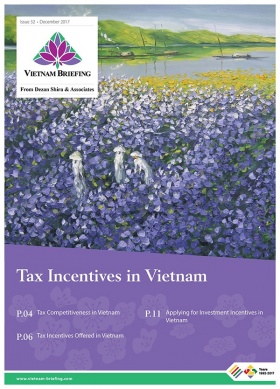Vietnam’s Competition Law and its Impact on Foreign Companies
Vietnam’s Law on Competition came into effect on July 1, 2019, replacing the 2004 version of the law. In June 2018, Vietnam passed the new regulation, which focuses on competition restraining agreements, market dominance, economic concentration, and unfair practices.
Scope of the law
The new law has expanded its scope and now includes both Vietnamese and foreign companies and individuals in case their actions have – or potentially have – a competition restriction impact on the domestic market. A competition restriction impact is an influence that will exclude, reduce, or hinder competition in the market.
The government will also have authority over offshore activities if there is an impact on the domestic market. The law will apply to foreign entities part of competition-restricting agreements, economic concentration, or other unfair activities even if they do not have a subsidiary in Vietnam.
In addition, public service units – such as hospitals and schools – have been brought under the ambit of the law, which was not the case in the previous version.
Regulatory bodies
Under the new law, the existing Vietnam Competition Authority and the Vietnam Competition Council have been merged to form the National Competition Committee (NCC). The Competition Investigation Agency has also been established under the NCC; it will be responsible for monitoring and investigating breaches of competition law.
The NCC will be a unit under the Ministry of Industry and Trade.
Anti-competitive agreements
The new law prohibits certain types of anti-competitive agreements if the firms are in the same market or if the agreements can impact market competitiveness.
Agreements prohibited in case firms are in the same market:
- Directly or indirectly fixing prices;
- Sharing customers or markets or supply sources; and
- Controlling the number of goods produced, sold, or bought as well as services provided.
Agreements prohibited in case they have a negative impact on market competitiveness:
- Restraining investments, technical, and technological capabilities; and
- Forcing other companies to sign contracts related to the buying or selling of goods and services or bind them into commitments not related to the content of the contract.
Earlier, these agreements were only prohibited in case the combined market share of the parties was 30 percent or more.
A leniency program has also been introduced in the new law. Now, companies that are part of an anti-competitive agreement may be entitled to leniency if they voluntarily reach out to the government authorities before an investigation is formally opened.
This program will only be available to the first three applicants, with the first applicant being eligible for a penalty exemption of 100 percent, while the second and third will be eligible for an exemption of 60 percent and 40 percent respectively.
Exemptions
The new law allows for certain exemptions if they can satisfy certain conditions, such as promoting technical progress or business efficiency. However, the new law imposes a five-year limit on any exemption. Extensions are limited to a maximum of five years and the NCC will decide whether to continue the exemption within 90 days prior to its expiry.
Economic concentration
Earlier, economic concentration activities such as mergers, acquisitions, consolidations, and joint ventures were prohibited in case the combined market shares of the entities were above 50 percent.
Now the combined market share condition has been removed and such activities can be prohibited even if they have a significant competition restraining impact on the market. The NCC will make the final decision based on the following factors:
- Combined market share;
- Level of concentration before and after the economic concentration;
- The relationship of the firms in the chain of production, distribution, or supply of goods/services or whose business lines acts as an input or is complementary in nature;
- Competitive advantages due to the economic concentration;
- The probability of the participating firms to significantly increase the prices or rate of profit after economic concentration; and
- The capability of the firms to remove or prevent other firms to enter the market;
In the previous version, economic concentrations activities that could lead to a market share of 30 percent or more were required to be reported to the relevant authorities. Under the new law, economic concentrations need to be reported to the NCC if they are subject to certain thresholds based on the below factors:
- Totals assets and turnover of the firms in the domestic market;
- Transaction value; and
- Combined market share.
Violations of economic concentration regulations will attract a penalty of five percent of the total turnover (preceding financial year) of the violating firm. Earlier the penalty was 10 percent.
Mergers and acquisitions
Before a merger, acquisition, or joint venture, the entities have to notify the regulator if certain thresholds are crossed such as assets and turnover as per the 2018 Law on Competition. While not mandatory, a pre-merger consultation with the entities involved and the regulator is helpful to see if there are any issues. This can be an informal, cost-free step to clarify merger regulations.
Once the entities submit to the regulator, the preliminary review should be completed in 30 days. If the NCC requires further time, it can extend the review to another 90 days, which can be further extended to 60 days for complex issues.
Market position and power
From July 2019, firms will be considered to be in a market dominating position if it has a market share of 30 percent or more and if it has significant market power. Market power will be determined by several factors such as:
- The financial strength of the firm;
- Technological advantages and technical infrastructure;
- Ownership and the right to possess and access infrastructure or use items of intellectual property rights;
- Correlation of market share among firms in the market; and
- Other factors specific to their sectors.
Vietnam’s new law on competition builds on the previous regulation and provides investors with clearer guidelines on the regulations. The move underlines the government’s intent to match Vietnam’s laws to international standards and this bodes well for foreign investors in the country.
Note: This article was first published in September 2018 and has been updated to include the latest developments.
About Us
Vietnam Briefing is produced by Dezan Shira & Associates. The firm assists foreign investors throughout Asia from offices across the world, including in Hanoi and Ho Chi Minh City. Readers may write to vietnam@dezshira.com for more support on doing business in Vietnam.
- Previous Article Land Rights in Vietnam – What They Are and How You Can Acquire Land
- Next Article Vietnam’s Maternity Leave – Benefits and Application































